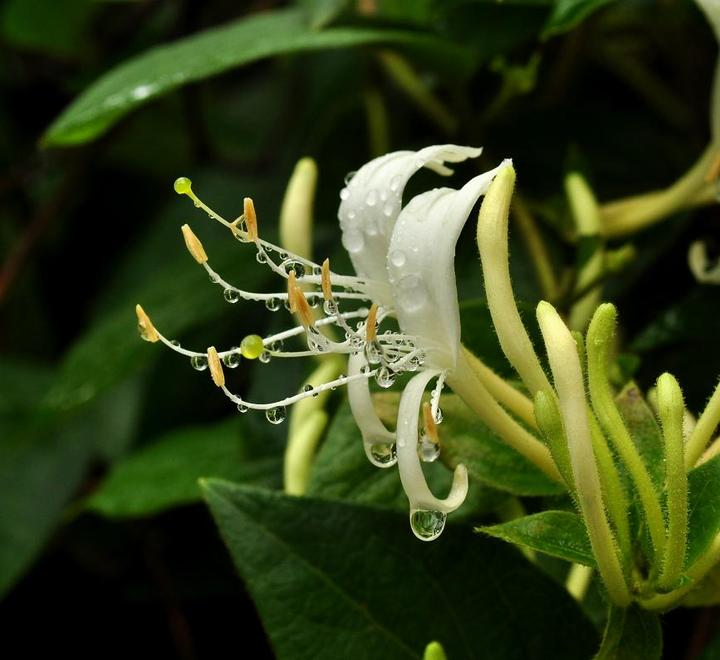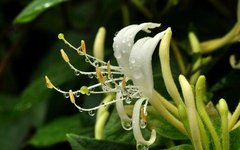
Click the blue text to follow us

In health preservation, flower tea is a popular choice, and today we discuss Jin Yin Hua (Honeysuckle). The name comes from the Compendium of Materia Medica, derived from its growth characteristics. Additionally, Jin Yin Hua is widely referred to by TCM experts as the “King of Herbs.” It consists of the dried flower buds or unopened flowers of the Lonicera japonica (Honeysuckle) plant, which includes varieties such as Lonicera japonica, Lonicera hypoglauca, Lonicera macranthoides, and Lonicera confusa. The flowers are harvested in early summer before blooming and then dried.
Jin Yin Hua is sweet and cold in nature; it enters the Lung (Fei), Heart (Xin), and Stomach (Wei) meridians.
It has the effects of clearing heat and detoxifying, dispersing wind-heat, and is clinically used to treat carbuncles, sore throat, heat-toxicity dysentery, wind-heat colds, and febrile diseases, making it a key herb for reducing swelling and detoxifying.
Jin Yin Hua is rich in organic acids, flavonoids, volatile oils, and iridoid glycosides, which possess anti-inflammatory, antibacterial, antiviral, antioxidant, liver-protective, and lipid-lowering activities.
Modern experimental studies have proven that Jin Yin Hua contains pharmacologically active components such as chlorogenic acid and luteoloside, which have strong inhibitory effects on various pathogenic bacteria, including Streptococcus hemolyticus and Staphylococcus aureus, as well as viruses causing upper respiratory infections. Additionally, it can enhance immunity and can be combined with other medications to treat respiratory infections, bacterial dysentery, and acute urinary tract infections, earning it the reputation of a TCM antibiotic.
During the flu season, it is common to find Jin Yin Hua in many antiviral TCM preparations, such as the well-known Lianhua Qingwen capsules (granules). Besides its antibacterial properties, regular consumption of Jin Yin Hua can help prevent throat issues, reduce inflammation and pain, prevent bad breath, and invigorate the mind.
Important Information on Taking Jin Yin Hua
First, Jin Yin Hua can be steeped in water or combined with other herbs in decoctions, with a typical dosage of 6-15g. It can also be used externally, but in moderation.
Individuals with a history of allergies to Jin Yin Hua should avoid its use.
Due to its cold nature, Jin Yin Hua is suitable for those with a balanced constitution or internal heat; however, it should be avoided by pregnant women, those with spleen and stomach deficiency, individuals with clear and thin pus from sores, patients with gastric ulcers, those suffering from cold-induced flu, rheumatoid arthritis patients, and individuals with yin deficiency.
Patients with favism should avoid Jin Yin Hua, as it may trigger hemolytic reactions or worsen their condition.
Do not consume overnight steeped Jin Yin Hua; it is not suitable for cold drinks as it may cause diarrhea. It should be consumed warm after being steeped in hot water.
References:
1. National Pharmacopoeia Commission. Pharmacopoeia of the People’s Republic of China: China Medical Science Press, 2020 edition.
2. Editorial Committee of the “Flora of China”. Flora of China: Science Press.
3. Luo Xuan, Wang Wei, Hu Benxiang, et al. Research Progress on the Antiviral Chemical Components and Effects of Jin Yin Hua [J]. Journal of Shaanxi University of Traditional Chinese Medicine, 2024, 47(02):138-143.
Department: Pharmacy
Reviewed by: Hui Lei
Edited by: Zhang Jundi Chief Editor: Wu Xin’an
Note: This article is for educational purposes only and should not be used as a basis for treatment. Seek medical attention if unwell.


Scan to follow
Medication Education

“Give a thumbs up before you go!”

